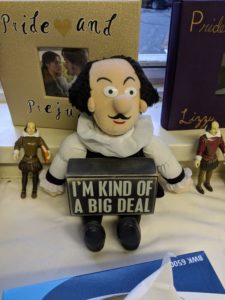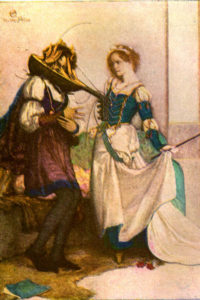So, how’d you spend your Shakespeare Day 2019? In the past I have gone on marathon posting binges, posting upwards of two dozen stories. Last year I wrote a Twitter bot that spent the day revisiting the archives. It’s a big day in my life, a huge day. My own personal holiday, that I look forward to more than my own birthday.
This year I did … nothing. And I feel like that merits an explanation.
 Just before St. Patrick’s Day this year I injured myself – tore my Achilles tendon. For the majority of folks who have not had that misfortune, allow me to sum it up — surgery, and then staying off your feet for over six weeks. There’s more to it than that (time in a splint, time in a cast, time in a boot…) but the end result is a complete disruption of your life for almost two months. I couldn’t even drive to work – luckily I sit behind a computer all day and my day job has been very understanding about me becoming a remote employee.
Just before St. Patrick’s Day this year I injured myself – tore my Achilles tendon. For the majority of folks who have not had that misfortune, allow me to sum it up — surgery, and then staying off your feet for over six weeks. There’s more to it than that (time in a splint, time in a cast, time in a boot…) but the end result is a complete disruption of your life for almost two months. I couldn’t even drive to work – luckily I sit behind a computer all day and my day job has been very understanding about me becoming a remote employee.
My first reaction when they told me was, “Woohoo! All day long at home? I’ll get *so much* done!” Yeah … no. You don’t realize how much you can’t do when you have to stand on one foot, and your hands are occupied by crutches. Even simple acts like going to the refrigerator (or the bathroom!) become a real chore. Sitting on the couch all day sounds like fun until you realize that you’re being forced to do that, even when you don’t want to.
And thus the chain reaction begins. Crutching around all day takes more energy out of you than just plain walking, so you’re more tired than normal. It will take more energy to actually do the things you need to do, so you end up with more inertia about staying right where you are. Then you feel guilty about the work that’s piling up that you’re not doing. Then you start looking forward and thinking, “Everything will go back to normal when I get my feet back, but until then everything’s basically on pause.”
As I read that back it sounds very “woe is me” and I do realize that there are probably people reading who’ve had the same injury saying, “What? No. I was back in the gym two days later.” I’m not saying I’ve had the greatest recovery. I was 50 years old and not in the greatest shape before I got literally swept off my feet. So maybe I took it harder than others might have. I’m just being honest here, because that’s part of why you’re all still reading after fourteen years of me doing this.
What’s it all got to do with Shakespeare? If I’m sitting on the couch anyway, already with the laptop ready to go, why am I not banging out the posts? My last real post to the blog was March 14, basically right before everything happened. During those first couple of weeks of recovery there was actual downtime, actual pain, actual painkillers. That wasn’t fun. Every day I’d say, “I should write something on the blog,” but then I wouldn’t, and then I’d feel guilty. The longer I waited, the more I’d think, “When I start posting again it has to be something good, not just glorified retweeting.”
Before I knew it, Shakespeare Day was upon me. Actually I totally knew – my most recent doctor’s appointment to remove my cast and switch me over to a “walking boot” was scheduled for April 23. So that was the big event of my yesterday, a milestone in my return to normal. I just was not in the right frame of mind to do something awesome for Shakespeare Day, and if I wasn’t going to do something awesome, I didn’t want to do anything.
So that’s my excuse. I do have a story to tell, which is coming in the next post. My Shakespeare Day was not without Shakespeare, fear not. I hope this post represents my return to regular posting. I’ve missed you all.
 I was actually a little surprised today to see somebody send me an Endgame spoiler over on Reddit. It was a randomly generated account so I’m guessing it was just blasted to everybody. Reddit doesn’t really have an advanced inbox system so it’s not like I could have ignored it — I click the “new messages” button and bam, there it is. Oh well.
I was actually a little surprised today to see somebody send me an Endgame spoiler over on Reddit. It was a randomly generated account so I’m guessing it was just blasted to everybody. Reddit doesn’t really have an advanced inbox system so it’s not like I could have ignored it — I click the “new messages” button and bam, there it is. Oh well.
 In marketing my merchandise I’ve often noted that “the dream” is to randomly bump into somebody wearing one of my t-shirts, because I’ll know I’ve found a kindred spirit. This week I learned to always have my eyes open because kindred spirits are all around.
In marketing my merchandise I’ve often noted that “the dream” is to randomly bump into somebody wearing one of my t-shirts, because I’ll know I’ve found a kindred spirit. This week I learned to always have my eyes open because kindred spirits are all around. Just before St. Patrick’s Day this year I injured myself – tore my Achilles tendon. For the majority of folks who have not had that misfortune, allow me to sum it up — surgery, and then staying off your feet for over six weeks. There’s more to it than that (time in a splint, time in a cast, time in a boot…) but the end result is a complete disruption of your life for almost two months. I couldn’t even drive to work – luckily I sit behind a computer all day and my day job has been very understanding about me becoming a remote employee.
Just before St. Patrick’s Day this year I injured myself – tore my Achilles tendon. For the majority of folks who have not had that misfortune, allow me to sum it up — surgery, and then staying off your feet for over six weeks. There’s more to it than that (time in a splint, time in a cast, time in a boot…) but the end result is a complete disruption of your life for almost two months. I couldn’t even drive to work – luckily I sit behind a computer all day and my day job has been very understanding about me becoming a remote employee. This post doesn’t contain much Shakespeare, let’s get that out of the way right now. I don’t like to misuse my audience. But it does have a father (me) and a daughter (mine) so at the end if we want to discuss which of Shakespeare’s play our relationship most resembles, we can see where that goes.
This post doesn’t contain much Shakespeare, let’s get that out of the way right now. I don’t like to misuse my audience. But it does have a father (me) and a daughter (mine) so at the end if we want to discuss which of Shakespeare’s play our relationship most resembles, we can see where that goes. So I may have mentioned, my daughter is studying Taming of the Shrew. And last night she was working on an assignment where she was supposed to discuss how an all female or all male production might change the interpretation and performance. She was supposed to pick a scene and talk about different ways it could be interpreted in this context.
So I may have mentioned, my daughter is studying Taming of the Shrew. And last night she was working on an assignment where she was supposed to discuss how an all female or all male production might change the interpretation and performance. She was supposed to pick a scene and talk about different ways it could be interpreted in this context.